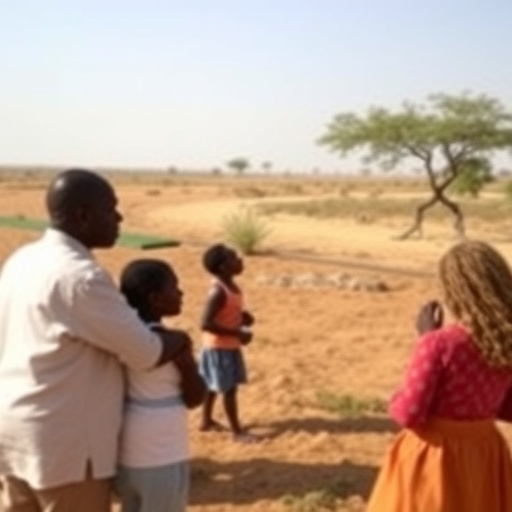In recent years, the global health community has increasingly turned to evidence-based interventions as a means to catalyze change within healthcare systems, particularly in regions with diverse and complex challenges. The push for scaling these interventions in African health systems has gained momentum, driven by the urgency of addressing endemic diseases and improving overall health outcomes across the continent. The significance of a recent study by Karamagi et al. highlights the dialogue surrounding these interventions, assessing their potential for widespread implementation and sustainability.
Understanding the African healthcare landscape is crucial for grasping the potential impact of evidence-based interventions. Africa’s health systems are often characterized by numerous barriers, including limited resources, fragmented care provision, and a variety of sociocultural factors that influence patient care and acceptance of medical interventions. The complexity of these systems necessitates a tailored approach, recognizing that a one-size-fits-all model would likely yield limited success. The authors delve into these intricacies, advocating for context-specific strategies that account for the unique challenges faced by various regions and communities.
The dialogue surrounding the scalability of such interventions involves several stakeholders, including government officials, healthcare providers, and community organizations. This collaborative approach is essential for fostering an environment conducive to implementing evidence-based solutions. Karamagi and colleagues emphasize that dialogue serves not merely as a platform for sharing knowledge, but as an instrumental mechanism for forging partnerships that bridge gaps between research, policy, and practice.
A key component of scaling interventions is the evidence that supports them. In their research, Karamagi et al. dissect various interventions previously tested within African healthcare settings, analyzing the data and outcomes associated with each. By highlighting successful case studies, the authors underscore the importance of robust data collection and analysis in informing policy decisions. This evidence base provides a necessary foundation for advocating for change and securing funding from donors and government entities alike.
However, the authors acknowledge that data alone is not enough. The challenge of integrating evidence-based practices into existing systems often comes down to the human element. The capacity and readiness of local healthcare workers to adopt these interventions play a significant role in their success. Training and continuous support for these workers become paramount to ensure that new methods are applied effectively. Through their findings, Karamagi et al. make a compelling case for investing in the human resources aspect of healthcare, which can often be overlooked in favor of focusing solely on clinical procedures and outcomes.
Another vital aspect discussed within the study is the importance of cultural relevance in designing and implementing health interventions. Interventions that do not resonate with the local population are unlikely to succeed. Karamagi and their team present the idea that understanding local customs, beliefs, and practices can aid in crafting messages and intervention strategies that are more relatable and thus more effective. Engaging community leaders can significantly enhance this aspect, as they can act as ambassadors for promoting health initiatives within their communities.
Technology also plays a pivotal role in the current landscape of health interventions. In an age where mobile phones and digital communication have permeated daily life, leveraging technology offers innovative avenues for delivering healthcare solutions. The authors propose utilizing telemedicine and health apps to extend the reach of evidence-based interventions, especially in rural areas where access to healthcare facilities may be limited. The integration of technology not only improves access but also facilitates the collection and dissemination of vital health data.
Scaling evidence-based interventions also requires a thorough understanding of the financial implications involved. Karamagi et al. discuss the necessity for a sustainable financing model that supports the ongoing implementation of successful interventions. The authors explore various funding mechanisms and highlight how international collaboration can enhance financial stability and resource allocation. Importantly, they stress that funding should not be viewed as a one-time solution but rather as a continuous investment in health improvement.
While the challenges are many, the dialogue initiated by the researchers signifies a turning point in addressing African health system needs. The study encapsulates moments of hope and practical approaches for overcoming obstacles. Karamagi et al. convey a sense of urgency coupled with optimism, urging stakeholders to unite in this common cause. The intersection of scientific rigor and grassroots engagement has the potential to reshape health outcomes across the continent.
As countries continue to navigate the impacts of the COVID-19 pandemic, the need for resilient health systems becomes ever more apparent. The researchers argue that this moment in history presents a unique opportunity for the African continent to reassess and reinforce its health systems. By prioritizing evidence-based interventions and scaling them effectively, African nations have the potential to emerge stronger and more capable of tackling existing and emerging health challenges.
In conclusion, Karamagi et al.’s study offers critical insights into the potential for scaling evidence-based interventions within African health systems, underscoring the multifaceted nature of the challenge. Their work serves as a call to action for stakeholders at all levels to engage in meaningful dialogue, collaborative efforts, and continuous investment in health to ensure lasting impact and improved health outcomes for all. Embracing evidence-based practices with a commitment to inclusivity can lay the groundwork for a healthier future in Africa.
Subject of Research: Scaling evidence-based interventions in African health systems
Article Title: Assessing the potential for scaling evidence-based interventions in African health systems: A deliberate dialogue.
Article References:
Karamagi, H.C., Charif, A.B., Kipruto, H.K. et al. Assessing the potential for scaling evidence-based interventions in African health systems: A deliberate dialogue.
Health Res Policy Sys 23, 91 (2025). https://doi.org/10.1186/s12961-025-01369-x
Image Credits: AI Generated
DOI:
Keywords: Evidence-based interventions, African health systems, scalability, healthcare, dialogue, community engagement, technology, sustainable financing, health outcomes.




